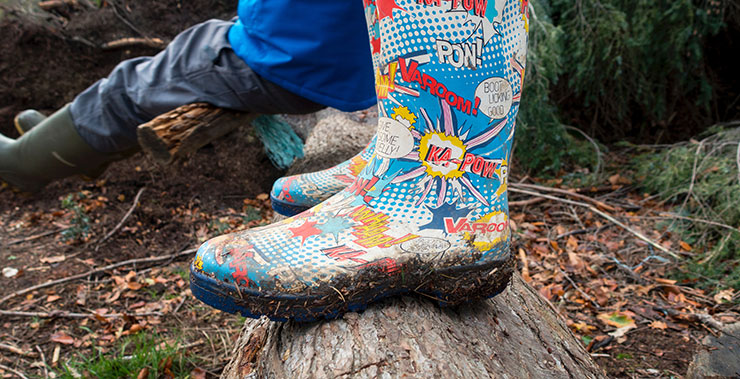Hero in Spanish: All the Superhero Phrases in Spanish You Need to Know
So you might be wondering “why are you writing an article about the word ‘hero’ in Spanish?”
(In case you were wondering, the word “hero” in Spanish is héroe. But that’s not the full story, more on that in a moment).
Here’s the thing. I’m known to be a bit nerdy. You may have seen some of my cosplays on Instagram or followed my Twitter musings about the latest in superhero cinema. I’ve also taken time to learn Klingon for the Star Trek convention I went to.
So I was thinking: “why not turn my nerdy side into a source for Spanish learning?”
After all, finding native resources you enjoy is key to sticking with a language. You could explore the world of Hispanic heroes. Try to learn comic book sounds with Spanish onomatopoeia. Or learn to talk about your favourite superhero movies in Spanish.
In fact, it’s a good idea to find some cool movies to watch in your target language. It will help you improve your listening comprehension and expose you to the different regional dialects of Spanish. And, resources like movies, novels, and comic books teach you common Spanish slang.
If your goal is Spanish immersion, and you love superheroes as much as I do, then you’re in the right place.
And who knows… once you’ve read this article, maybe you’ll discover your own Spanish superpowers!
How to say “Hero” in Spanish

Let’s start with how to say “hero” in Spanish. “Hero” is héroe, but could also be protagonista. The “protagonist” or main character. The female version of “hero” in Spanish, or “heroine”, is heroína.
Sometimes heroes are called other things, right? Like…
- Superhero: superhéroe
- Warrior: el guerrero / la guerrera
- Knight in shining armor: caballero de brillante armadura
- A god or goddess: un dios / una diosa
- Demigod: el semidiós / la semidiosa
- Soldier: el soldado
- Peacekeeper: pacificadora
- Champion: el campeón / la campeona
- Captain: el capitán / la capitana
- Professor: el prefesor / la profesora
- Mutants: los mutantes
- Avenger: el vengador / la vengadora
So if you want to talk about Thor, God of Thunder, he’s Thor, dios del trueno. Professor X from the X-Men would be Profesor X. The Winter Sollder? El Soldado de Invierno.
Some superhero vocab is the same in English and Spanish. For instance, if you’re talking about Star Wars, it’s still “jedi” and “padawan”, but a “jedi master” would be maestro jedi.
But you could use a phrase like this in everyday life, too. If someone’s saved your day, you could call them “mi héroe”, or “my hero” in Spanish.
Spanish Superhero Vocabulary
It’s a good idea to have some basic Spanish vocabulary for everyday things before attempting to watch a movie or read a comic book in Spanish. But there is also some superhero-specific vocabulary you need to learn to help you along the way.
Before you delve into the fictional universe of your choice, try this tip. Read through a story summary in Spanish.
The back cover of a Spanish novel, the Wikipedia summary in Spanish for a comic book, or whatever it is you’re learning.
So, if you wanted to watch The Avengers in Spanish, you could look it up on Spanish Wikipedia, and see that they’re called Los Vengadores. Some of the personajes principales, or “main characters”: Capitán América, Ojo de Halcón (Hawkeye), Viuda Negra (Black Widow), Máquina de Guerra (War Machine), Pantera Negra (Black Panther), La Avispa (The Wasp), and Valquiria (Valkyrie). You’d learn about the miembros del equipo, or “team members”.
By learning their Spanish names, and some of the universe-specific vocab, you will understand faster. Often, the names will be the same or cognates to English, meaning they’re easy to recognize because they’re similar. But others may be a bit different, like La Avispa, or “The Wasp”.
Here are common superhero vocab to learn:
- Secret identity: Identidad secreta
- Mask: La máscara
- Cape: Capa
- Enemy: Enemigo / Enemiga
- Nemesis: Némesis
- Justice: Justicia
- Origin: Origen
- Command center: El centro de comando
- Sidekick: El compañero / La compañera
- Universe: El universo
- Galaxy: La galaxia
- Spaceship: La astronave
- Battle: La batalla
- War: La guerra
- Immortals: Los inmortales
- Power: El poder
- Responsibility: La responsabilidad
- Duty: El deber
- Evil Villain: El villano malvado / La villana malvada
- Rescue: Rescatar
- Save: *Salvar
- Protect: Proteger
- Guard: Guardar
- Fight: Luchar
Plus, you’ll want to know that “movie” is cine or película and “comic book” is el libro cómico. That way, you can say “I love superhero movies” in Spanish, or Me encantan las películas de superhéroes.
Superhero Sound FX in Spanish

If you’ve ever read a comic book, you know they’re full of sound effects like “bam!” and “pow!” And reading comics in Spanish will open up that whole world of SFX called Spanish onomatopoeia.
Spanish onomatopoeia are words that are supposed to mimic a sound. An explosion would be “BOOM!” in English, mimicking the sound. It may surprise you, but this isn’t universal. In fact, many languages have different interpretations of how a sound… sounds. Like a dog sound in English is “woof”, but in Spanish, it’s guau.
Learning onomatopoeia isn’t just helpful for reading comics, but can also help you grasp context more easily.
Following the dog bark example, what if you don’t know that the Spanish word “to bark” is ladrar? The onomatopoeia guau may help you understand that the sentence is talking about a dog barking.
The same is true when speaking. If someone said, El perro seguía ladrando, como guau guau guau … You would get the idea that “The dog kept barking.” Sometimes they’re used in sentences too, to describe what happened with a sound or when telling a story.
Hubo una fuerte explosión, como ¡PATAPLUM!
“There was a loud explosion, like ‘BOOM!’”
Nos vasos se chocan “chin-chin” con un brindis por salud.
“Our glasses clink with a toast to good health.”
Some common comic book Spanish onomatopoeia are:
- Boom: Pataplum
- Squeak: Ñeec
- Bang: Zasca
- Zap: Zas
- Splash: Plaf
- Pow: Pum
- Om nom nom: Ñam, ñam
- Hahaha: Jajaja
- Ding: Rin
- Achoo: Achí
- Clink: Chinchín
- Hiss: Siseo
- Clank, clank: Tan, tan
- Knock knock: Toc toc
- Crack: Crag
While not superhero comics, you can practice these Spanish sounds with classic newspaper comic strips. There’s also native Spanish comics, like Supercholo, a superhero comic from Peru. Or try the humorous Pafman.
Famous Fictional Hispanic Superheroes
There are lots of Hispanic superheroes to read about! Your mind may already be racing to Marvel or DC, but let me remind you of the most infamous superhero…
Zorro
Zorro, the masked, sword-wielding vigilante, was actually the inspiration for Batman. His secret identity, Don Diego de la Vega, is from a wealthy family in California. He’s always got a bounty on his head! But his swordsmanship always allows him to escape… But not before leaving behind his trademark “Z” slashed into his foes.
The hero has been made into many books, movies, and TV shows, including The Legend of Zorro featuring Antonio Banderas. You could try your hand at the Spanish-language novel, Zorro.
Diablo
Diablo is one of the few Hispanic antiheroes featured in the DC universe, most recently in Suicide Squad. Diablo’s superhero powers give him the ability to control and expel flames from his body. But he loses control when he gets angry and hurts those around him.
Miles Morales
Thanks to the popularity of Into the Spiderverse, Miles Morales is possibly one of the most famous Latin superheroes. In the movie, he gets bit by a radioactive spider and also gains the powers of Spiderman. Although, there are many more like him, that come together to defeat an evil villain and get back to their own stories.
You can watch clips of the movie in Spanish to improve your skills.
Araña — Spidergirl

Araña literally means “spider” in Spanish. And this Spidergirl has all the same abilities as Spiderman… But she’s bilingual.
Her secret identity is Anya Corazón, and she has her own comic series called Araña, The Heart of the Spider.
White Tiger
Hector Ayala, also known as the White Tiger, was the first Hispanic superhero in the Marvel comic universe. His superhuman strength, agility, and martial arts skills made him a classic favourite. Later, his sister Ava assumes the role of White Tiger.
Miss America
One of the newer superheroes, Miss America can travel through dimensions through the power to create portals. She’s one of the members of the Young Avengers and is supposed to be getting her own series.
Practicing Your Spanish with Superhero Movies and Comics
Movies and comics give you a glimpse at more conversational Spanish and help teach you about the culture. But you’ll need some strategies to get the most from your study time with them. Here are some pointers:
- Focus on what you know first. Watch a clip, or read a page of the comic, once through. Focus on identifying cognates or words you already know, and try to make sense of what you can first. Then, listen or read again. On the third try, add subtitles or look up the translation to fill in the blanks.
- Take notes. Write down key phrases that pop up often, like “fighting crime”, for example. Add them to your Anki deck or flashcards to memorize so when you hear them next, you’ll grasp them fast.
- Try reiterating the scene. Practice telling a friend what happened in the movie, or rewrite the dialogue as a summary. This will give you practice talking about your interests and improve your grasp on what you heard or read.
- Use social media as a guide. There are lots of social media channels and accounts that post about comics and movies in Spanish. Follow them so you get exposure to how natives discuss them. Try leaving comments in Spanish for them, too!
- Switch to Spanish subtitles and audio whenever you can. Sometimes a show or movie you already watch will have the option to switch to Spanish audio or add Spanish subtitles. That can help you switch up a routine you already have to a Spanish learning resource.
Go Practice Your Superhero Spanish Powers
Now go dive deep into a universe in your target language! Try finding your favourite comic in Spanish (eBay can be a great resource), or change the audio on Netflix. It’s an amazing feeling to switch one of your nerdy interests to Spanish and enjoy it in a whole new way.



Social